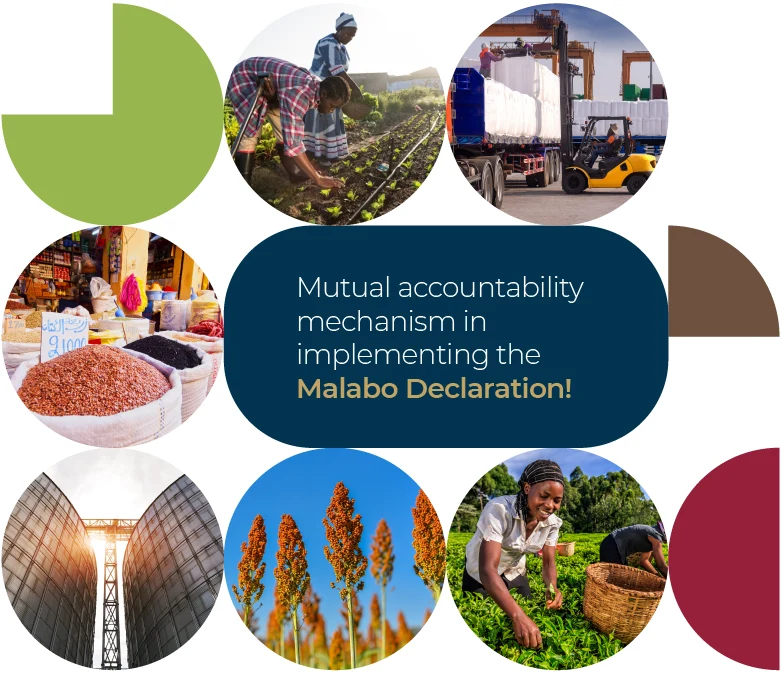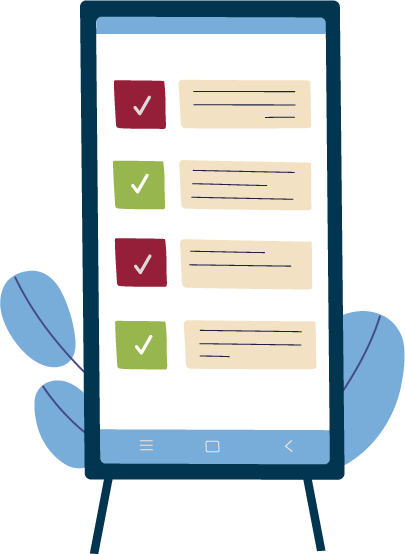
Post MALABO
Background and Context
Comprehensive Africa Agriculture Development Programme (CAADP) is Africa’s policy framework on agricultural transformation, wealth creation, food security and nutrition, economic growth, and prosperity for all. CAADP goal is an agriculture led development that eliminates hunger, reduces poverty and food insecurity, enabling expansion for exports and higher economic growth path based on sustainable development and natural resources preservation principles. The 2014 Malabo Declaration on Accelerated Agricultural Growth and Transformation for Shared Prosperity and Improved Livelihoods constitutes a recommitment to the CAADP principles and values through seven commitments – find here the CAADP Malabo Commitments.
The continent has achieved significant progress after 20 years of CAADP implementation, but immense challenges remain. Successive Biennial Review reports indicates that the continent is not yet on track to meet the Malabo 2025 target. With the Malabo declaration ending in 2025, African Union and its partners have embarked on a process to outline the next 10-year agricultural CAADP agenda for the continent. The Post Malabo CAADP Agenda development process has three work streams – Stakeholder consultations, Analysis, design and drafting, and Political mobilization – across the continent culminating in the declaration of a new agenda and commitments by the Heads of States and Governments (HOSG) in the first quarter of 2025.
Post Malabo CAADP Agenda Development Process Concept Note and Roadmap
Curabitur ac leo nunc estibul et mauris vel ante finibus maximus nec ut leo
Joint Action (Work) Plan for Post Malabo Process
Curabitur ac leo nunc estibul et mauris vel ante finibus maximus nec ut leo
CAADP emphasizes the use of evidence to inform policy development, multiple stakeholder participation and coordination, mutual accountability and political commitment for actions and results. All these principles are factored in the design of Post Malabo CAADP Agenda development process to ensure formulation of sound declaration and action plan (priorities, polities, strategies and targets) that capture the necessary innovation, lessons, good practices, adaptation and scale up in response to emerging trends and the needs of the continent. This guiding note provides information on the governance and coordination structure, process, timelines, and how stakeholders can participate, provide input, and support the Post Malabo process to ensure greater outreach, contribution and ownership by stakeholders.
Post Malabo Structure
Governance and Coordination Structure for Post Malabo Process
Timeline
Post Malabo Process Roadmap - Timelines
Process and Approaches
Post Malabo Stakeholder Consultations Process and Approaches
Stakeholder consultations focuses on enhancing stakeholder awareness and understanding, capturing stakeholder inputs, and validating the post-Malabo agenda. It is also key for ownership, buy-in and commitment to the priorities, actions and targets.
The objectives of stakeholder consultations are to:
01
Facilitate outreach, awareness, socialization, building momentum and political buy-in for the Post Malabo process and issues
02
Facilitate stakeholder reflections and learning on the last 10 years of CAADP with a view to informing the future
03
Enable stakeholders to provide input into and inform the post-Malabo agenda
04
Have a wider perspective and begin build consensus on key issues and technical options
The main stakeholder consultations methods and approaches include regional consultations, Consultation of specific CAADP constituencies, Technical Roundtables, and submission of Independent memoranda. Various CAADP stakeholder constituencies can participate and provide their input for the Post Malabo Agenda through the platforms, approaches and activities outlined below. Post Malabo Process coordination Team will develop technical guidelines and reporting outline for stakeholder consultations.
RECs led Regional Stakeholder Consultations in Five (5) AU Regions
Lorem ipsum dolor sit amet, consectetur adipiscing elit. Ut elit tellus, luctus nec ullamcorper mattis, pulvinar dapibus leo.
CAADP Constituency Based Consultations
Lorem ipsum dolor sit amet, consectetur adipiscing elit. Ut elit tellus, luctus nec ullamcorper mattis, pulvinar dapibus leo.
Technical Roundtable and Webinar Series
Lorem ipsum dolor sit amet, consectetur adipiscing elit. Ut elit tellus, luctus nec ullamcorper mattis, pulvinar dapibus leo.
Submission of Independent Memoranda
Lorem ipsum dolor sit amet, consectetur adipiscing elit. Ut elit tellus, luctus nec ullamcorper mattis, pulvinar dapibus leo.
Discovery
Analysis and Research
Analysis and data analytics work stream is being led/ coordinated by AKADEMIYA 2063. The analysis is conducted by 13 Technical Working Groups, based on clearly outlined TOR, work plan and deliverables. Members of TWGs are eminent experts of continental and global standing selected based on experience, expertise, and achievement in specific thematic areas. Recruitment of TWGs members is in the final stage. The exercise was coordinated by A2063 in consultation with oversight committee and final list approved by AU. In constituting various TWGs, AU sought balance representation between research/academia and practitioners and ensured that key constituencies are represented in relevant TWGs as appropriate. Each TWG will have a convener and a co-convener.
Stakeholder who wishes to participate, contribute and/or provide input to specific TWGs can do so through A2063, Respective TWG conveners, Post Malabo Process Coordinator or Oversight committee.

Technical Working Groups/ Thematic Areas
Lorem ipsum dolor sit amet, consectetur adipiscing elit. Ut elit tellus, luctus nec ullamcorper mattis, pulvinar dapibus leo. Lorem ipsum dolor sit amet, consectetur adipiscing elit. Ut elit tellus, luctus nec ullamcorper mattis, pulvinar dapibus leo. Lorem ipsum dolor sit amet, consectetur adipiscing elit. Ut elit tellus, luctus nec ullamcorper mattis, pulvinar dapibus leo. Lorem ipsum dolor sit amet, consectetur adipiscing elit. Ut elit tellus, luctus nec ullamcorper mattis, pulvinar dapibus leo. Lorem ipsum dolor sit amet, consectetur adipiscing elit. Ut elit tellus, luctus nec ullamcorper mattis, pulvinar dapibus leo.
In addition to the analysis conducted by TWGs (coordinated by A2063), Policy LINK will conduct targeted analysis on two thematic areas:
- Stakeholder Analysis Landscape – to identify structures, lessons and gaps.
- Analysis of Implementation and Coordination Capacity – focus on institutional arrangement and delivery mechanism for CAADP.
Stakeholders (organizations and individuals) who would like to submit materials (studies, case studies, lessons) on these topics should do so through the email postmalabo@africa-union.org
Development
Drafting Process
Drafting process will integrate input from stakeholder consultations and analysis work streams to develop the Post Malabo Agenda and Action Plan. AU will develop the TOR and establish a drafting committee of carefully selected experts, as soon as possible, to review the input from the two work streams and use it to draft the key elements of the Agenda and Action Plan.
AU and its partners will organize the drafting committee meetings/ workshops for this purpose.

Stakeholder Validation - CAADP Partnership Platform and MAPLE
Stakeholder validation of the Post Malabo Agenda will be held during the 2024 CAADP Partnership Platform and Maputo Annual Planning and Learning Event (MAPLE). The objective of the validation meeting in October 2024 will be to:
- Facilitate awareness, dialogue, learning and reflection on the content of the agenda
- Facilitate reflection on the implication and adaptations, investments and actions required to implement the Post Malabo Agenda
- Validate, mobilize and rally action for the Post Malabo Agenda
- Explore strategic partnerships and coordination required for Post Malabo Agenda
Stakeholder validation meeting will be open to all the strategic partners and key stakeholders in the African Agriculture space and with interested on CAADP and African food security agenda. The partners and stakeholder interested in participating in the stakeholder validation can reach out to AU and/or Post Malabo Process Coordinator for more details, or register to participate through the appropriate registration portal when its activated.
Engagements
Political Mobilization and Engagement Process
Political engagement processes are important to secure wider political buy-in, ownership, commitment and accountability.
Specific processes, and activities led by AU shall include:
01
Regional ministerial meetings - to submitted regional input for notification and endorse by REC’s Sectoral Ministers
02
Special Technical Committee (STC) meeting to endorse the proposed Agenda
03
Extra-ordinary Summit to endorse the new Post Malabo CAADP Agenda - Kampala Declaration and Action Plan
04
Activities/ initiatives to elevate the CAADP Agenda in targeted global forums/ platforms

How to Participate and Support
Stakeholders and partners can participate through the processes outlined above. Interested partners can provide technical and financial support by supporting specific work streams, activities or TWGs or directly through AU. Kindly reach out to AU if you are interested in supporting any aspect of the Post Malabo Process.
Important Contacts for Post Malabo Process
Contact us
For questions
to the CAADP team